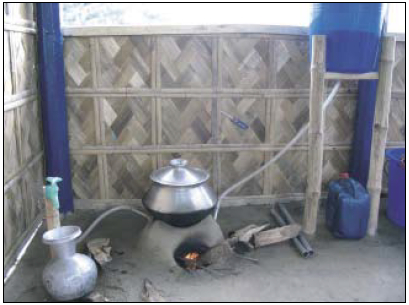Chulli pasteurization
| |
|
|
|
|
|
|
|
|
|
Pasteurization is the process of disinfecting water by heat or radiation. Typical water pasteurization achieves the same effect as boiling, but at a lower temperature (usually 65-75°C), over a longer period of time.
The chulli stove system combines two water treatment processes: filtration and pasteurization. Water flows first through a rapid sand filter and then into aluminium tubing coiled inside a traditional clay stove (chulli). From the stove, the water flows through heat resistant plastic tubing to an outlet tap, where it is collected in a container.
The water is pasteurized during daily cooking. By regulating the flow, the water temperature can be maintained at 70°C; sufficient for pasteurization as it flows through the coil.
Larger pathogens (e.g. protozoa, helminths), suspended particles (e.g. sand, silt. clay), and iron are removed through the filter. Pathogens are killed or inactivated at 65°C.
Construction, operations and maintenance
The source water is poured into the top of the rapid sand filter (20-25 litre container filled with clean sand). The water flows through the aluminium tubing coiled within the chulli stove, and collected in a heat resistant container. Whenever the stove is being used for cooking, the outlet tap must be open. There must also always be water in the system. This will prevent super-heating the water and tubing inside the chulli, which may cause breakage or leaks.
The height difference between the filter and the outlet tap should be adjusted, and the maximum flow rate at the outlet tap set to 0.5 litres/minute, to regulate the water temperature at 70°C.
Lab experiments showed that adjusting the tap to a flow of 0.5 litres/minute provided a residence time inside the coil of about 45 seconds, and water at 70°.
Systems should not be used with the tap closed, water should not be collected/consumed without a fire burning, and systems should not be allowed to run.
Robustness
- The system requires no additional inputs for operation after installation; may require maintenance/repair
- Leakage and breakage of the plastic or aluminum tubing may occur; repairs may mean breaking the stove apart and rebuilding
- Plastic taps in the lower container can break, metal taps last longer but increase cost
Worldwide Producers:
- Developed by Prof. Mohammad Fakhrul Islam at Rajshahi University, and has also been researched and supported by UNICEF (Bangladesh) and Wagtech International (Bangladesh).

